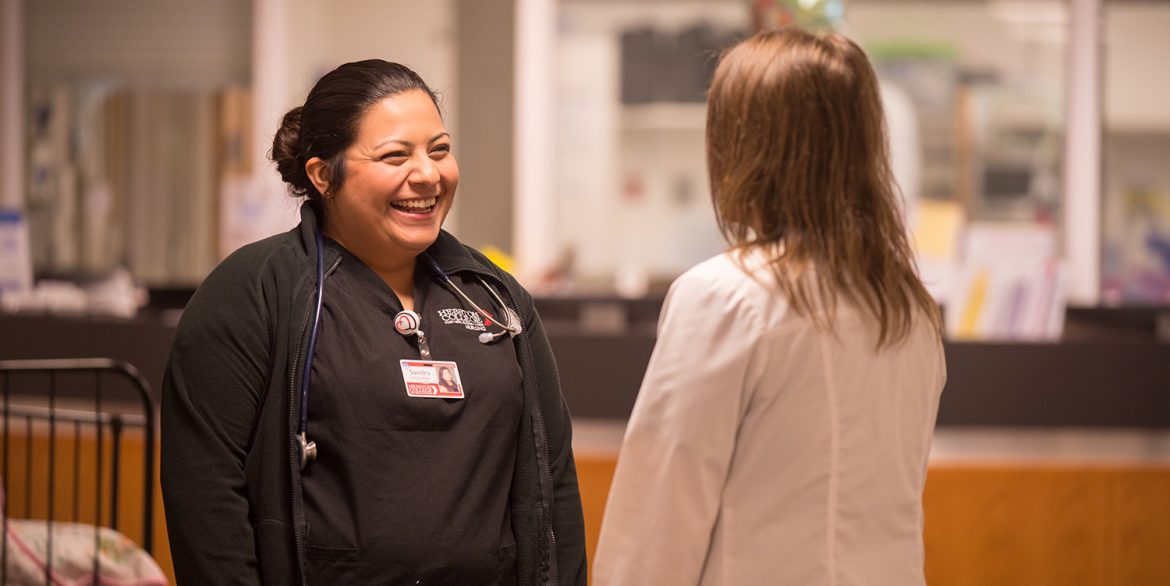How long has Hesston College been educating nurses?
- Pre-nursing was introduced to the Hesston College curriculum in 1945, and until 1967, nursing students completed their first year of pre-nursing at Hesston College and then transferred to LaJunta, Colo., (1945 to 1957) or to Kansas City General Hospital (1956 to 1967) for nursing courses and clinical experience.
- In 1966, the associate degree in nursing program (ADN) was initiated at Hesston, and the first nursing class graduated in 1968. To date, more than 1,600 nurses have graduated from the Hesston College ADN program, embodying the tradition of Christian service through their commitment to quality, holistic care. The 50th and final ADN class completed the program in spring of 2017. The associate degree in nursing program was continuously accredited from 1970-2017 by the National League for Nursing (NLN), National League for Nursing Accrediting Commission (NLNAC), and the Accreditation Commission for Accreditation in Nursing (ACEN).
- In the fall 2015, in response to the health care demands for baccalaureate-prepared nurses, Hesston launched a four-year bachelor of science in nursing program (BSN). The first class graduated in May 2017.
Is the BSN program accredited?
The baccalaureate degree program in nursing at Hesston College is accredited by the Commission on Collegiate Nursing Education (http://www.ccneaccreditation.org). Hesston’s BSN nursing program is also approved by the Kansas State Board of Nursing.
What do I need to have in order to get into Hesston’s Nursing program?
Applicants are required to meet minimum testing (ACT, SAT or ACCUPLACER) and GPA requirements, provide transcripts of high school and college coursework, submit references and complete prerequisite courses designed to give a solid foundation for nursing.
Where will I practice nursing skills?
Students participate in active, engaging classroom sessions on campus in the new Bonnie Sowers Nursing Center. Each semester, they also spend time in the campus nursing skills lab learning and practicing clinical procedures. Students then integrate theory and skills in the simulation laboratory on campus where they provide nursing care for simulated patients in a wide variety of clinical scenarios. These simulated experiences build the knowledge, skill and confidence that enable students to implement safe, holistic care to real-life patients in the clinical setting. Students go to a variety of healthcare facilities for clinical experience, including community hospitals, large urban medical centers and population-based settings located within 30 miles of campus.
What employment choices will I have after graduation?
You will have options in many settings: small community hospitals and large urban medical centers, clinics, specialty care centers, home health, public health, dialysis, schools, industry and community settings. Hesston BSN graduates will have opportunities to work with clients needing preventative, medical, surgical, critical/complex, mental health, maternal, pediatric, rehabilitation and long-term care. BSN-prepared nurses are also taking active roles in management, leadership, quality, safety and informatics. Hesston College graduates have an excellent employment record with local health care agencies. In recent years, 100% of our graduates have secured RN jobs upon graduation.
Are graduates satisfied with their Hesston College nursing education?
According to our end of program survey,
- Our 2017 BSN graduates rated their overall satisfaction with the nursing program as 4.75 on a 5.0 scale, with 5.0 = “Very Satisfied”
- 100% of our 2017 BSN graduates said that they would choose the Hesston College nursing program again
- 100% of our 2017 BSN graduates said that they will recommend Hesston College Nursing to others


